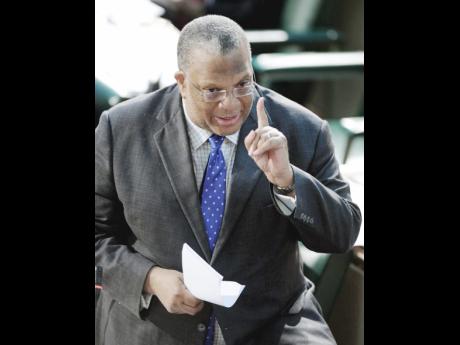Published:Wednesday | September 30, 2015Edmond Campbell
Beginning in April 2016, public-sector workers are expected to start contributing to their pension payments as the Government moves to introduce pension legislation amendments by the end of November this year.
According to the Fiscal Policy Paper for financial year 2015-2016 interim report: “The new public-pension system is expected to be effective at the start of financial year 2016-2017, with the required pension legislation amendments expected to be tabled by end-November 2015.”
The Govern-ment had proposed that public-sector workers would be asked to contribute five per cent of their salaries to their pensions under the public-sector pension reform.
It was proposed that parliamentarians and parish councillors would be asked to pay six per cent.
The arrangement calls for the scheme to be run as a defined-benefit system, where all payments flow into a segregated fund under trust instead of the Consolidated Fund.
In 2013, the Government tabled a White Paper on pension reform in Parliament, which contained recommendations from a joint select committee that deliberated on pension reform.
The committee had recommended that the retirement age be changed from 60 to 65 under a reformed system to come into being by April 2016.
SHAW’S CONCERNS
Yesterday, Opposition Spokesman on Finance Audley Shaw quizzed his government counterpart on the issue of pension reform.
He wanted to know if the five per cent contribution to be made by public-sector workers to their pension payments would effectively “neutralise” the seven per cent increase granted to public-sector workers for the two-year wage agreement signed with 80 per cent of the public sector.
Responding, Finance Minister Dr Peter Phillips said the specific arrangements to be made for implementation are to be decided
by the Cabinet, in collaboration with representatives of the civil service.
Turning to the recently signed wage agreement with a significant percentage of the public sector, Phillips said the Government would make payment on arrears before the end of the current fiscal year. He said the administration was seeking to complete negotiations with the balance of public-sector groups during the third fiscal quarter.
Phillips also made it clear that the Government did not intend to take any drastic action or carry out wholesale layoffs in the public sector.
“We will not proceed in that way,” he said.
Phillips yesterday tabled the Fiscal Policy Paper interim report for financial year 2015-2016 in Parliament.
The finance minister revealed that the Government would, this fiscal year, make significant cuts in gross recurrent expenditure of about $8.6 billion, owing to projected shortfall in revenue and higher-than-planned compensation costs to public-sector workers.
He said details of the cuts would be presented later this year in the First Supplementary Estimates of Expenditure.
Phillips told his parliamentary colleagues that for financial year 2016-2017, the main challenge facing the Government was to achieve the nine per cent wage to gross domestic product (GDP) ratio by March 2017.
The wage-to-GDP ratio has trended downwards from 11 per cent in financial year 2013-2014 to 10.2 per cent in the last fiscal year.
“The Government of Jamaica will continue to work closely with public-sector groups to ensure that the schedule of payments arising from these and future decisions will be consistent with attainment of the agreed wage ceiling of nine per cent of GDP by March 2017,” Phillips said




Leave A Comment